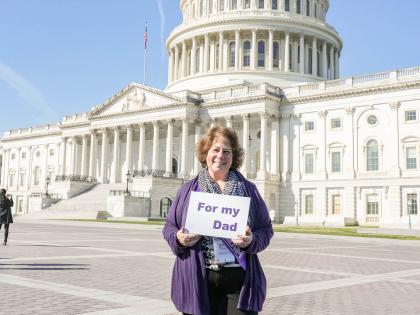North Dakota State Alzheimer’s Plan Overview

In 2007, the North Dakota legislature approved House Concurrent Resolution No. 3022 to study the current and future impact of Alzheimer’s disease within the state. The Dementia-Related Services — Background Memorandum was presented to the state’s Long-Term Care Committee in 2007. In 2020, funds were allocated to support an update of the state plan, allowing the state to convene a work group to conduct a current and comprehensive needs assessment and develop a new set of recommendations. A new plan was released in 2022, coinciding with the launch of data-focused Alzheimer’s/Dementia Dashboard on the North Dakota Department of Health’s website.
North Dakota 2026 Policy Priorities

Establish a Dementia Services Coordinator Position
North Dakota is home to more than 13,000 individuals living with Alzheimer’s and their 19,000 unpaid caregivers. As the population with dementia continues to grow, coordination between state agencies that administer programs for people living with dementia and their caregivers is crucial. The Alzheimer’s Association is urging the Department of Health and Human Services to hire a full-time Dementia Services Coordinator. This state government position will coordinate North Dakota’s response to dementia by assessing the implementation of the Alzheimer’s State plan, identifying gaps in existing services and programs, and recommending strategies and policies to better serve North Dakotans living with dementia and their caregivers.
Requiring Dementia-Specific Training for Guardians and Conservators
Dementia can significantly affect a person’s ability to make decisions, and in the absence of other advanced directives, people living with dementia may need the assistance of a guardian or conservator. To ensure that the rights, values, and preferences of people living with dementia are upheld under guardianship or conservatorship, the Alzheimer’s Association is calling on the Office of Guardianship and Conservatorship to create rules to require guardians and conservators who are serving people living with dementia to have dementia-specific training.

Establish Continuing Education Requirements for Clinicians
A cornerstone of providing quality dementia care is dementia-specific training for clinicians. Clinicians, however, often do not have sufficient knowledge on dementia including the new Food and Drug Administration (FDA) approved treatment options that can slow disease progression in early stages. The Alzheimer’s Association is calling on the North Dakota Board of Medicine to update licensing requirements to include dementia-specific training as a Continuing Medical Education (CME) training requirement.
Sign Up to Learn About Advocacy Opportunities in North Dakota

Find My Chapter
Together, we’re making an impact. Find an Alzheimer’s Association chapter in your community for more ways to engage.
Contact Us
State Affairs Contact: Grace Gill
Phone: 605.377.6445
Email: gegill@alz.org
13,700
people living with Alzheimer’s in North Dakota
19,000
North Dakotans are providing unpaid care
$233 Million
Medicaid cost of caring for people living with Alzheimer’s (2025)
336
deaths from Alzheimer’s in 2022
18%
in hospice with a primary diagnosis of dementia
42.1%
increase of geriatricians in North Dakota needed to meet the demand in 2050
Resources to Drive Change in North Dakota
The following resources developed by AIM and the Alzheimer’s Association will help you learn more about the issues impacting people living with Alzheimer’s and their caregivers, how North Dakota policymakers are addressing these gaps, and how you can help drive change.